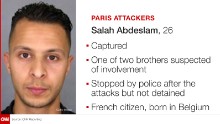Paris terror suspect Salah Abdeslam charged with terrorist murder
A day after being captured in a fierce gunbattle in Belgium, Salah Abdeslam has been charged with participation in a terrorist murder -- last fall's horrific attacks in Paris that left 130 people dead, prosecutors said Saturday.
Abdeslam also was charged with taking part in the activities in a terrorist organization, according to a statement from the Belgian federal prosecutor's office. The office doesn't specify which terror group, though ISIS claimed it was responsible for the Paris carnage.
Monir Ahmed Alaaj, also known as Amine Choukri -- the other man wounded in a raid Friday in the Brussels' suburb of Molenbeek -- faces the same charges.
Of the three others detained in the operation, one faces charges of participating in a terror group's activities and hiding criminals, and another with hiding criminals. The third was freed without being charged.
Abdeslam and Alaaj went directly to hospitals after the Molenbeek raid. Abdeslam, who suffered a minor wound in the gunbattle, arrived Saturday at a high-security prison in Bruges, Belgium, the Bruges Penitentiary Complex told CNN.
Abdeslam fighting extradition
At least nine terrorists killed 130 people in Parisian restaurants, shops and a concert venue the night of November 13. Abdeslam, the only suspect known to survive, was on the run until Friday, when he was arrested after a gunbattle in Molenbeek, a suburb of Brussels.
It may take three months to extradite Abdeslam, 26, to France, Paris prosecutor Francois Molins said at a press briefing.
The Belgium-born French citizen is cooperating with investigators but is fighting extradition, his lawyer, Sven Mary, told reporters.
Belgian Prime Minister Charles Michel said authorities in his country will do their best to arrange for the extradition "as soon as possible."
Molins said authorities have interviewed Abdeslam once and are still trying to confirm his role in the attacks. He said Abdelsam had a key role in planning the attacks.
Investigators think Abdeslam may have been the driver of the black Renault Clio that dropped off three suicide bombers near the Stade de France, one of the attack sites.
Did Abdeslam plan to use suicide belt?
His DNA was found on a discarded suicide belt found on a Paris street after the attacks, investigators have said.
Molins said Abdeslam's told investigators that he planned to blow himself up at the Stade de France but simply backed down. However, the prosecutor said he was suspicious of that statement.
Molins reminded reporters that in a communique issued by ISIS following the Paris attacks, the terror group mentioned the commissioning of an attack in the 18th district of the French capital.
That's why Abdeslam's statement "must be taken with precaution," Molins said.
"Investigations must determine if a suicide attack by Salah Abdeslam was supposed to take place in the 18th district," Molins said.
After the attacks, Abdeslam is believed to have called friends to take him to Belgium. They passed through police checkpoints, but Abdeslam had not yet been identified as a suspect and they were allowed to continue on their way.
DNA found
Abdeslam's fingerprints and DNA allegedly were found three days ago when police raided a Brussels apartment. One person was killed in that raid and two people escaped.
The man killed by a special forces sniper was Mohamed Belkaid, an Algerian who used the name Samir Bouzid. He is believed to have directed the Paris attackers via calls from Belgium.
Belkaid helped Abdeslam travel prior to the attacks, a Belgian senior counter-terrorism official told CNN in January.
Authorities believe he was using the apartment as a hideout following the Paris attacks, according to the official.
An intense manhunt resulted in Abdeslam's arrest.
Molenbeek has 'foreign fighter problem'
The impoverished Brussels suburb of Molenbeek has a reputation as a hotbed for jihadism.
Members of its large, predominantly Muslim population -- many of them immigrants from North Africa -- have been linked to terror plots and attacks.
Last fall, Belgian Justice Minister Koen Geens said more needs to be done to address what he called Belgium's "foreign fighter problem" in the suburb.
In the immediate aftermath of the Paris attacks, authorities detained numerous people there. Police continued to conduct operations in Molenbeek into Saturday morning.
French officials praised the police action that led to Abdeslam's capture. Interior Minister Bernard Cazeneuve called it "an important blow to the terrorist organization Daesh in Europe," using another moniker for ISIS, which has claimed it was responsible for the Paris attacks.
"This is not the end of the fight that we are leading relentlessly against terrorism," Cazeneuve said. "We need to maintain our vigilance to be ahead of the threat."
News Courtesy: www.cnn.com











